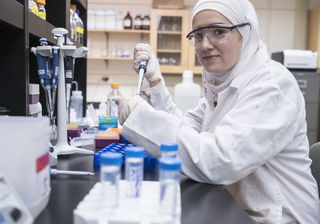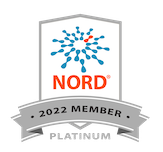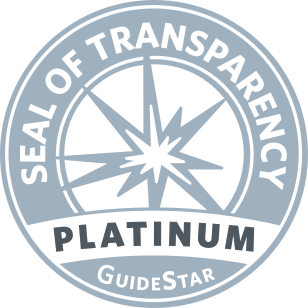Don’t Let Others Tell You What You Can’t Do
Beacon Stories
Naheda, a brilliant scientist, has never let her visual impairment stop her from accomplishing her goals and encourages other students with disabilities not to be intimidated by difficult situations. Her story underscores how important it is to ask for help when needed to achieve success.
Naheda Sahtout is a brilliant young scientist. She is also legally blind with visual acuity of less than 20/200. She was born with a visual impairment, but the underlying cause remains a mystery, which would frustrate many people. But Naheda adapted to her vision loss and has gone on to be successful in her chosen field of science. She lives in Saskatchewan, Canada, and currently holds a master’s degree in molecular and cellular biology and will soon finish her doctorate. She has never let her visual impairment stop her from accomplishing her goals and encourages other students with disabilities not to be intimidated by difficult situations. Her story underscores how important it is to ask for help when needed and for educators to become more proactive and responsive to their students with disabilities so that they can achieve success.
That’s how I manage to succeed; I push myself out of my comfort zone to find what works for me.
Early on in her doctoral studies, Naheda made it known that she would require support from her colleagues to help her look in a microscope, a task she knows she does not do well. She felt fortunate to find a supervisor who allowed her to receive this kind of support since not all of them would.
“I think the most important lesson I learned is there are lot of things I can do, but there are certain things I know I cannot do, and it’s all about being able to identify strengths and weaknesses and not putting myself in positions that I know I’ll fail,” says Naheda.
Most universities and colleges have disability and accessibility services for students, but unfortunately, many do not take advantage of them because of the stigma they fear will follow them. Naheda did use the service in her undergraduate studies so that she would have a larger font on her exams and more time, if necessary, to complete them. She admitted that she still doesn’t ask for assistance as much as she should because of that stigma and only recently started to apply for grant money to get assistive technology that she would use now and in a future job. By not always asking for assistance or help, Naheda recalls she was forced to make herself look for other ways to be self-sufficient.

Naheda Sahtout working in her lab. Photo Credit: David Stobbe
“That’s how I manage to succeed; I push myself out of my comfort zone to find what works for me,” says Naheda. “But I am only one visually impaired student, and I don’t know how many others are at the same university. There are people with other illnesses, physical and mental that supervisors don’t understand. There needs to be an education system in place so that they can understand why their student isn’t being productive instead of assuming they just don’t want to work. Everyone has a different way of approaching things, and those students can still succeed if they’re given the proper resources and support.”
Naheda has hopes for the future since things are already starting to get better, “There are places like the Canadian National Institute for the Blind. I think universities are becoming more aware that they need to be connected to these agencies so that they can support their students to the best of their abilities.” Naheda also pointed out that there is a difference between undergrad and graduate studies. Many programs in graduate school are thesis- and research-based. “In my case, I don’t take courses. So, I don’t need a notetaker. But I might need a specific type of technology. They should work with me and say, ‘How can we make that available?’”
Removing the stigma around students with disabilities will not happen overnight. But over time, the more people act as advocates for themselves and their success, the sooner it will happen. It’s also important for educators to be aware of the different kinds of assisted technology that is available for their visually impaired students. As proven with Naheda, there is so much more to someone than just their disability. When given the proper support and resources students can excel.
Naheda has an important message for other students who might be finding their journey through academia difficult. “Don’t be afraid to ask for help and don’t let other people tell you what you cannot do because of your impairment. There are always ways that we can accommodate ourselves and find things that work the best for us.”




